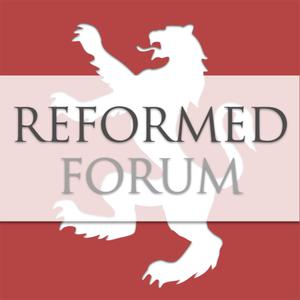
Reformed Forum
Reformed Forum
- 13 minutes 9 secondsTrinity and Salvation: Redeemed by the Son (Ephesians 1:7–11) | Calvinism: The Plan of Salvation (Lesson 7)
This is the seventh lesson in Dr. Lane G. Tipton’s Reformed Academy course, Calvinism: The Plan of Salvation. This lesson covers the following topics:
0:00 The Historical Accomplishment of Redemption
2:57 The Blood of Christ as the Climax of Old Testament Redemption
6:26 Blood and the Forgiveness of Sins
8:14 Deliverance by Blood in the Book of Revelation
Register for this free on-demand course on our website to track your progress, download supplemental materials, and assess your understanding through quizzes for each lesson. You will also receive free access to twenty-four additional five-hour video courses in covenant theology, apologetics, biblical studies, church history, and more: https://reformedforum.org/courses/calvinism-the-plan-of-salvation/
Your donations enable us to provide free Reformed resources for students like you all across the world: https://reformedforum.org/donate/
#Calvinism #salvation #reformedtheology
20 January 2025, 5:00 am - 1 hour 13 minutesLivestream | Reflections on Numbers and the Call to Ministry
In this lively Friday afternoon livestream recorded on January 17, 2025, Camden Bucey and a panel of guests discuss upcoming events, including Greenville Presbyterian Theological Seminary’s Confessional Conference, themed “The Pastor: His Call, Character, and Work.” The panel includes Pat Daly (Greenville Seminary), Stephen Spinnenweber (Westminster PCA, Jacksonville), Ryan Noha (Reformed Forum), and Carlton Wynne (Westminster PCA, Atlanta; Reformed Theological Seminary, Atlanta).
They preview the conference’s lineup, including talks on pastoral calling, ministry, and the broader applications of confessional theology.
Camden and Ryan highlight upcoming Reformed Forum events in Oklahoma City and California, offering opportunities to engage in robust theological discussions and fellowship.
Stephen shares insights from his current sermon series on the Book of Numbers, uncovering its rich ecclesiological and redemptive themes. The panel also reflects on the challenges of preaching through difficult books and the joy of revealing Christ in all of Scripture.
Chapters- 00:00 Introduction to the Live Stream and Panel
- 03:00 Greenville Conference Overview
- 08:07 The Unique Community of the Greenville Conference
- 10:02 Carlton Wynne’s Insights on Pastoral Calling
- 15:54 Exploring the Nature of Pastoral Ministry
- 18:07 Upcoming Events and Future Plans
- 24:56 Fellowship and Worship Opportunities
- 26:45 Upcoming Conferences and Events
- 28:26 Memorable Experiences and Connections
- 30:11 Exploring Historical Figures and Their Impact
- 31:36 Engaging with Contemporary Discussions
- 33:08 Critiques and Insights on Apologetics
- 37:39 Theological Frameworks in Apologetics
- 41:09 Preaching Through Challenging Texts
- 42:00 Insights on the Book of Numbers
- 48:37 Exploring the Book of Numbers
- 50:12 The Impact of Preaching on Congregation
- 51:41 Challenges in Old Testament Preaching
- 54:15 The Aaronic Benediction and Its Significance
- 56:23 Resources for Preaching and Teaching
- 58:17 Introduction to Stephen’s Book
- 01:01:01 Understanding the Law of God
- 01:03:51 The Three Uses of the Law
- 01:06:12 Final Thoughts and Future Plans
18 January 2025, 3:35 pm - 59 minutes 28 secondsGreg Beale | The Use of the Old Testament in Colossians
In this episode we welcome back Dr. G. K. Beale, professor of New Testament at Reformed Theological Seminary in Dallas, to discuss Paul’s use of the Old Testament in his letter to the church in Colossae. Dr. Beale has written an insightful commentary on Colossians and Philemon in which he highlights the theological depth and practical application of these epistles, focusing on the Old Testament allusions in Colossians and their relevance to Paul’s message of Christ’s supremacy and the believer’s union with Him.
The conversation explores the nature of Paul’s argument against syncretistic false teaching, the significance of Christ as the true temple, and the practical implications of Paul’s exhortations for the church today. Dr. Beale also shares his method for identifying Old Testament allusions and discusses the relationship between Ephesians and Colossians.
This episode is a rich resource for pastors, teachers, and students interested in biblical theology, exegesis, and the practical application of Scripture.
Chapters- 00:07 Introduction
- 04:36 AI in NT Studies
- 13:10 Reformed Forum Seminary in Oklahoma City
- 15:37 Introduction to Colossians
- 21:27 Quotations and Allusions
- 25:15 The Nature of the Colossian Heresy
- 29:12 The Relationship between Colossians and Ephesians
- 32:05 Old Testament Allusions in Colossians
- 53:12 Initiation into and Maturity in Christ
- 55:19 The Elemental Principles of the World
- 58:46 Conclusion
17 January 2025, 6:00 am - 58 minutes 24 secondsSummary of Christian Doctrine: The Second Coming of ChristThis week on Theology Simply Profound, Rob and Bob discuss Louis Berkhof’s little book, Summary of Christian Doctrine. On today’s episode, under the larger section, “The Doctrine of the Last Things,” we begin to discuss chapter XXIX, "The Second Coming of Christ."14 January 2025, 10:00 am
- 23 minutes 3 secondsTrinity and Salvation: Eternally Elected by the Father (Ephesians 1:3–6) | Calvinism: The Plan of Salvation (Lesson 6)
This is the sixth lesson in Dr. Lane G. Tipton’s Reformed Academy course, Calvinism: The Plan of Salvation. This lesson covers the following topics:
0:00 Introduction
4:16 Present Union with Christ
9:18 Predestinarian Union with Christ
14:10 The Basis and Goal of Predestination
19:40 The Grace of God
Register for this free on-demand course on our website to track your progress, download supplemental materials, and assess your understanding through quizzes for each lesson. You will also receive free access to twenty-four additional five-hour video courses in covenant theology, apologetics, biblical studies, church history, and more: https://reformedforum.org/courses/calvinism-the-plan-of-salvation/
Your donations enable us to provide free Reformed resources for students like you all across the world: https://reformedforum.org/donate/
#Calvinism #salvation #reformedtheology
13 January 2025, 5:00 am - 57 minutes 51 secondsVos Group #93 — Truth in the Fourth Gospel and Jesus' View of the Bible
In this episode, we consider the profound theological insights of Geerhardus Vos as found in pp. 355–360 of his Biblical Theology. Camden Bucey and Lane Tipton explore the Johannine concept of truth, which transcends human-centered definitions like coherence or correspondence theories. Instead, John presents truth as an intrinsic, divine attribute embodied in the Logos, Jesus Christ, and rooted in heavenly realities.
The discussion highlights how Jesus is both the fulfillment and culmination of the Old Testament, uniting Christocentrism and Christotelism to show that all Scripture points to him. From heavenly realities and earthly shadows to worship in Spirit and truth, the episode unpacks the eschatological depth of John’s Gospel and the organic unity of God’s redemptive revelation.
We also reflect on Jesus’ own hermeneutic, his attitude toward Scripture as the “most orthodox of the orthodox,” and how his approach undergirds the Reformation’s emphasis on the open access of Scripture to all people. This rich conversation will deepen your understanding of biblical theology, worship, and the relationship between the Old and New Testaments.
Join us as we uncover how Christ is not only the center but also the goal of all Scripture, illuminating God’s unified message of redemption across the ages.
Chapters- 00:07 Introduction
- 05:27 Upcoming Oklahoma City Seminar
- 10:12 True and Truth in the Gospel of John
- 19:57 Heavenly Realities and Earthly Shadows
- 31:47 Jesus' Attitude toward the Old Testament
- 35:16 Christo-Centrism and Christotelism
- 47:28 The Fulfillment of the Scriptures
- 55:26 Conclusion
10 January 2025, 6:00 am - 25 minutes 29 secondsGod’s Sovereign Election (Romans 9:9–23) | Calvinism: The Plan of Salvation (Lesson 5)
This is the fifth lesson in Dr. Lane G. Tipton’s Reformed Academy course, Calvinism: The Plan of Salvation. This lesson covers the following topics:
0:00 Introduction to Unconditional Election
5:06 Jacob I Loved, But Esau I Hated
12:27 The Prayer of the Tax Collector
16:57 Pharoah’s Heart Hardened
18:34 God’s Sovereign Election: Objections Answered
21:13 Pastoral Application of Unconditional Election
Register for this free on-demand course on our website to track your progress, download supplemental materials, and assess your understanding through quizzes for each lesson. You will also receive free access to twenty-four additional five-hour video courses in covenant theology, apologetics, biblical studies, church history, and more: https://reformedforum.org/courses/calvinism-the-plan-of-salvation/
Your donations enable us to provide free Reformed resources for students like you all across the world: https://reformedforum.org/donate/
#Calvinism #salvation #reformedtheology
6 January 2025, 5:00 am - 32 minutes 6 secondsReformed Forum Live (January 3, 2025)
Join us as we reflect on 2024 and look forward to what’s ahead for Reformed Forum in 2025! This livestream covers key updates, including:
📖 End-of-Year Wrap-Up
We share the results of our Equipped to Grow campaign, inspired by 2 Peter 3:18. Together, we’ve made significant progress toward our goals and reached supporters across 12 countries!
🌐 Website Improvements
We’re working on a redesigned homepage and menu, part of our effort to make our distinctively Reformed and redemptive-historical resources more accessible to everyone.
📚 Forthcoming Publications
Exciting updates on upcoming books, including Discovering Christ in All of Scripture, God’s Gift of Himself, and Union with Christ: The Benefits of His Suffering and Glory.
📅 Upcoming Events
Mark your calendars for our Orange County meetup on January 25, 2025 and a special event in Oklahoma City on February 21–22, 2025. We’re eager to share these updates and continue pursuing our mission to support the church in presenting every person mature in Christ.
Watch a recording of the stream at https://youtube.com/live/DBZiM6CtGE0
3 January 2025, 10:12 pm - 1 hour 13 minutesHighlights from 2024
In this episode, we look back upon the year and highlight clips from our ten most watched videos.
- 00:00:07 Introduction
- 00:04:14 Adonis Vidu — Exploring the Doctrine of Inseparable Operations
- 00:11:17 Aaron Renn — Life in the Negative World
- 00:15:15 Harrison Perkins — Exploring Covenant Theology among the Theological Disciplines
- 00:24:11 Van Til Group #13 — Roman Catholic and Evangelical Views of Sin and Human Consciousness
- 00:34:09 Iain Wright and Yannick Imbert — Reclaiming the “Dark Ages”
- 00:41:49 Greg Beale — Union with the Resurrected Christ
- 00:48:15 David Hall — Irony and the PCA
- 00:52:13 Cornelis Van Dam — Considering the Historicity of Genesis 1 and 2
- 00:55:21 Greg Beale and Ben Gladd — Dictionary of the NT Use of the OT
- 00:57:41 Alan Strange, Darryl Hart, Nick Willborn, and Timon Cline — Politics, Culture, and the Spiritual Mission of the Church
- 01:11:49 Conclusion
3 January 2025, 6:00 am - 37 minutes 17 secondsThe Plan of Salvation: Historical Options, Part 2 | Calvinism: The Plan of Salvation (Lesson 4)
This is the fourth lesson in Dr. Lane G. Tipton’s Reformed Academy course, Calvinism: The Plan of Salvation. This lesson covers the following topics:
0:00 On What Basis Does God Save? (Universalism vs. Particularism)
3:10 Remonstrant Arminianism
8:37 Wesleyan Arminianism
18:05 Post-Reformation Lutheranism
27:39 Particularism or Calvinism
32:03 Conditional vs. Unconditional Election
33:45 Two Basic Truths
Register for this free on-demand course on our website to track your progress, download supplemental materials, and assess your understanding through quizzes for each lesson. You will also receive free access to twenty-four additional five-hour video courses in covenant theology, apologetics, biblical studies, church history, and more: https://reformedforum.org/courses/calvinism-the-plan-of-salvation/
Your donations enable us to provide free Reformed resources for students like you all across the world: https://reformedforum.org/donate/
#Calvinism #salvation #reformedtheology
30 December 2024, 5:00 am - 4 hours 6 minutesThe 2024 Christmas Extravaganza
Join us for the Reformed Forum Christmas Extravaganza 2024, a four-hour special filled with lively theological discussion, reflections on the past year, and a look ahead to what’s in store for 2025. Hosted by Camden Bucey, this festive livestream features contributions from regular panelists Lane Tipton, Bob Tarullo, Jim Cassidy, Carlton Wynne, and special guests like Ruth Huang, a Mid-America Reformed Seminary student working on translating Reformed resources into Chinese.
Explore topics ranging from the state of the church worldwide to the joys and challenges of ministry in different cultural contexts. Enjoy special segments with Pamela York performing jazz piano, Kurt Vetterli sharing insights on ministry in Switzerland, and James Chu discussing the challenges and opportunities for ministry in the Philippines. These moments provide a global perspective on the Reformed faith and the work of the church across cultures.
Plus, enjoy games, giveaways, and reflections on Reformed theology, all delivered with the warmth and camaraderie of the Reformed Forum community. Whether you’re a long-time listener or discovering us for the first time, this episode captures the heart of our mission: to equip believers to grow in the grace and knowledge of our Lord Jesus Christ.
Visit ReformedForum.org/donate to support our year-end campaign and help us continue providing free theological resources worldwide.
Chapters- 00:00:00 Sponsor: Five More Talents
- 00:01:04 Introduction
- 00:33:58 Ruth Huang and the Church in Asia
- 01:08:04 Steve Schmidt Hosts Wits & Wagers
- 01:44:12 Joe Cristman’s Top Books of 2024
- 02:18:56 Ministry and Campaign Update with Ryan Noha
- 02:28:38 Pamela York Plays Jazz
- 02:47:56 Kurt Vetterli on Ministry in Switzerland
- 03:11:19 Brad Isbell with the Top Stories of 2024
- 03:29:35 James Chu on Ministry in the Philippines
- 03:59:05 Wrap-Up and Announcement of Giveaway Winners
27 December 2024, 6:00 am - More Episodes? Get the App
Your feedback is valuable to us. Should you encounter any bugs, glitches, lack of functionality or other problems, please email us on [email protected] or join Moon.FM Telegram Group where you can talk directly to the dev team who are happy to answer any queries.
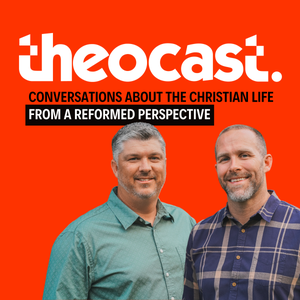 Theocast
Theocast
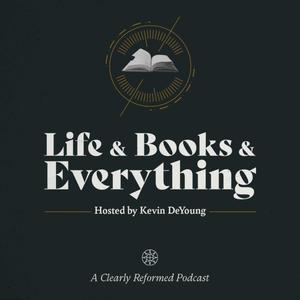 Life and Books and Everything
Life and Books and Everything
 White Horse Inn
White Horse Inn
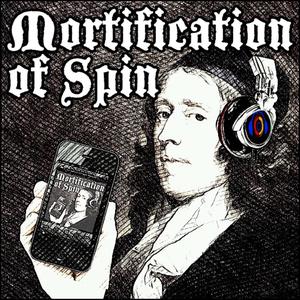 Mortification of Spin
Mortification of Spin
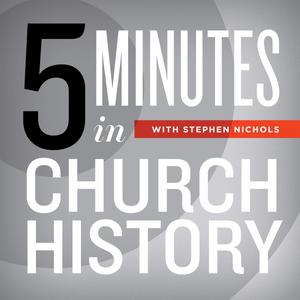 5 Minutes in Church History with Stephen Nichols
5 Minutes in Church History with Stephen Nichols